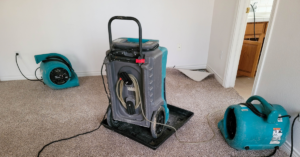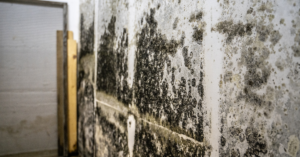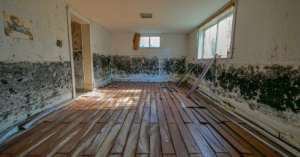The Musty Smell You Can’t Ignore
Have you walked into your home and been hit with a damp, earthy, or musty smell that just won’t go away? That smell could be mold. And while it might seem harmless at first, it’s often the first warning sign of a much bigger issue. Mold doesn’t just smell bad—it can impact your health, damage your home, and lower your indoor air quality.
If you’re experiencing that mold smell in house, keep reading. We’ll break down what causes it, where to look, what to do, and when it’s time to call in the pros.
What Does Mold Smell Like?
Mold typically smells musty, stale, or earthy. Many describe it as the scent of rotting wood, wet socks, or an old basement. The smell is caused by microbial volatile organic compounds (MVOCs) released as mold grows and spreads.
If you’re noticing:
- A persistent musty odor that doesn’t go away
- Musty smells stronger in certain rooms (especially after being away for a while)
- An odor that intensifies with humidity smell
…you may be dealing with hidden mold.
Wondering exactly what does mold smell like? Trust your nose. It usually presents as a must smell that clings to walls, carpets, and even clothing.
Where Is That Mold Smell Coming From?

Mold can hide in places you rarely check. Common sources include:
- Bathrooms: Leaky pipes, poor ventilation
- Kitchens: Under sinks or behind appliances
- Basements: Damp walls, carpets, or stored items
- Attics: Roof leaks or poor airflow
- HVAC systems: Mold in air ducts spreads odor throughout the house
Tip: Trust your nose. If you notice a musty smell most strongly in one room, inspect that space first. Still unsure? A professional mold inspection can pinpoint the hidden source.
How Mold Smell Affects Your Health and Home
A musty smell isn’t just unpleasant. It’s often a sign that your air quality has been compromised.

Health Effects of Mold Exposure:
- Allergic reactions (sneezing, coughing, itchy eyes)
- Respiratory issues or worsening asthma
- Fatigue or headaches
Property Risks:
- Damage to drywall, insulation, and wood
- Spread to hidden areas like crawlspaces
- Decreased property value if left untreated
What To Do If Your House Smells Like Mold

Immediate Steps You Can Take:
- Increase ventilation: open windows and use exhaust fans
- Run a dehumidifier to reduce moisture (aim for <60% humidity)
- Clean visible mold using proper safety gear (N95 mask, gloves)
- Wash affected fabrics, rugs, and curtains
But be cautious: DIY is only safe for small, surface-level mold. If the mold smell in house persists, or if you can’t find the source, it’s time to bring in professionals for mold remediation services.
Long-Term Mold Smell Prevention Tips
- Fix Leaks Promptly: Even small drips can lead to big mold problems
- Keep Humidity in Check: Use dehumidifiers and check basement/attic moisture
- Ensure Proper Ventilation: Especially in kitchens, bathrooms, and laundry rooms
- Regular Maintenance: Clean gutters, check seals, inspect HVAC
- Use Air Purifiers: HEPA filters can help reduce spores and odors
For more tips, see our guide on winter water damage prevention.
When to Call a Mold Remediation Specialist
If your efforts aren’t resolving the issue, it’s likely you’re dealing with a deeper, hidden mold problem.
At Bio Clean of Utah, we:
- Perform thorough mold inspections using professional tools
- Provide certified mold testing and removal
- Treat affected areas to prevent future growth
- Work directly with your insurance
- Are IICRC Certified and available 24/7
Don’t wait for the smell to worsen. Mold grows fast—and so do the risks.
Call us now at (801) 335-3227 for an estimate or 24/7 assistance.
FAQ: What People Also Ask
Q: What does mold in a house smell like?
A: It often smells musty, earthy, or like damp paper or wood. Learn more about how to identify mold.
Q: Is it unsafe to smell mold?
A: Yes. Breathing in mold spores can lead to health issues, especially for those with allergies or respiratory conditions.
Q: How can I get rid of the mold smell fast?
A: Improve ventilation, reduce humidity, and clean visible mold. For persistent smells, contact a mold cleanup expert.
Q: What if I can’t find the mold?
A: Mold can hide behind walls, under floors, or in HVAC systems. Professional inspections can detect hidden sources.
Ready to Breathe Easier?
You don’t have to live with that musty smell or risk your health. Whether you’re unsure where it’s coming from or know you need help, Bio Clean of Utah is your trusted partner for residential mold removal in Utah County and Salt Lake County.
Call (801) 335-3227 or request an estimate today. Let us help you get your home back to fresh, clean, and safe.
- Is It Black Mold or Mildew? How to Tell — And What to Do Next - June 1, 2025
- Mold Smell in Your House? Here’s What It Means—And What to Do About It - April 17, 2025
- What to Do Immediately After Water Damage? - March 7, 2025







